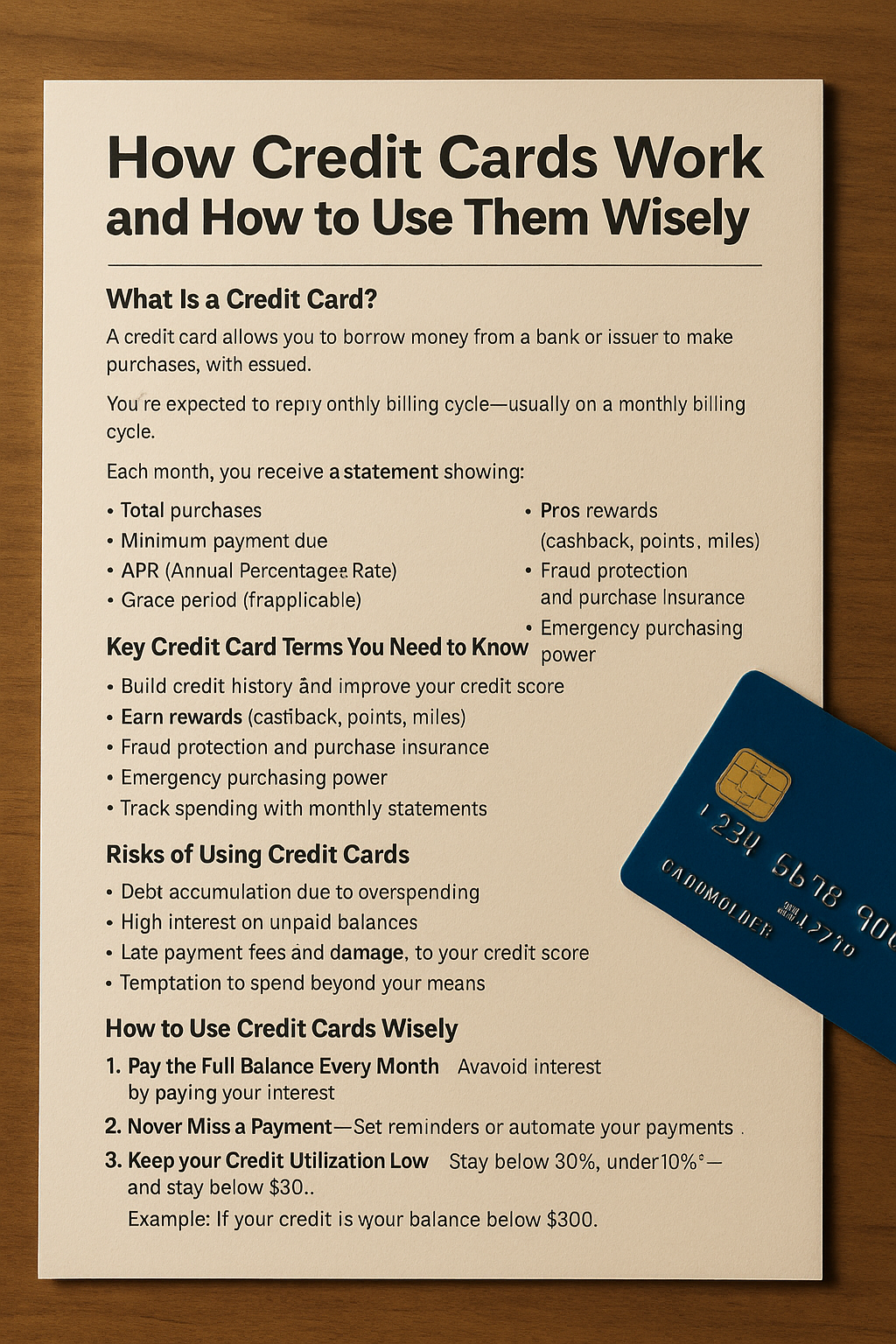Credit cards can be powerful financial tools—or dangerous traps. The difference lies in how you use them. When managed correctly, they help build your credit score, earn rewards, and offer convenience. But misused, they can lead to high-interest debt and financial stress.
In this article, you’ll learn how credit cards work, their pros and cons, and practical tips to use them wisely.
What Is a Credit Card?
A credit card allows you to borrow money from a bank or issuer to make purchases. You’re expected to repay what you borrow—usually on a monthly billing cycle.
Unlike debit cards, which draw from your bank account, credit cards let you borrow now and pay later.
Each month, you receive a statement showing:
- Total purchases
- Minimum payment due
- Payment due date
- Interest charges (if applicable)
- Available credit
Key Credit Card Terms You Need to Know
Understanding the terminology is essential for smart usage:
- Credit limit: The maximum amount you’re allowed to borrow
- Balance: The amount you currently owe
- Minimum payment: The smallest amount you must pay to avoid penalties
- APR (Annual Percentage Rate): The interest rate on unpaid balances
- Grace period: Time between the end of your billing cycle and the payment due date when no interest is charged
- Cash advance: Borrowing cash using your card—usually with high fees
How Interest Works
If you pay your full balance before the due date, you pay no interest. But if you carry a balance, you’ll pay interest on the remaining amount—often 15% to 25% APR or higher.
Interest compounds daily, meaning you pay interest on interest, which can grow your debt quickly.
Pros of Using Credit Cards
Used responsibly, credit cards offer several benefits:
- Build credit history and improve your credit score
- Earn rewards (cashback, points, miles)
- Fraud protection and purchase insurance
- Emergency purchasing power
- Track spending with monthly statements
Risks of Using Credit Cards
Without discipline, credit cards can be harmful:
- Debt accumulation due to overspending
- High interest on unpaid balances
- Late payment fees and damage to your credit score
- Temptation to spend beyond your means
How to Use Credit Cards Wisely
Follow these best practices to avoid trouble and take full advantage of your credit card.
1. Pay the Full Balance Every Month
Avoid interest by paying your statement balance in full before the due date. This keeps you out of debt and protects your credit score.
2. Never Miss a Payment
Set reminders or automate your payments. Even one missed payment can hurt your credit score and result in late fees.
3. Keep Your Credit Utilization Low
Credit utilization is how much of your credit limit you’re using. Experts recommend staying below 30%—even better, under 10%.
Example: If your credit limit is $1,000, keep your balance below $300.
4. Don’t Treat Credit as Extra Income
A credit card is a tool, not an extension of your salary. Don’t use it to live beyond your means or fund lifestyle inflation.
Spend only what you could pay in cash.
5. Monitor Your Statements and Credit Score
Check your credit card statement monthly to:
- Catch fraudulent charges
- Identify spending habits
- Avoid billing errors
Use free tools like Credit Karma or your bank’s app to track your credit score.
6. Choose the Right Card for You
Look for a card that matches your needs:
- No annual fee for beginners
- Cashback if you want rewards
- Travel cards if you fly often
- Low-interest cards if you tend to carry a balance
Compare terms and fees before applying.
7. Avoid Cash Advances
Cash advances usually come with:
- No grace period
- High interest rates
- Additional fees
Avoid using your credit card to withdraw cash unless it’s an emergency.
8. Know When to Use It (and When Not To)
Use your credit card for:
- Regular monthly bills (that you can afford)
- Online purchases with fraud protection
- Travel bookings (for insurance and rewards)
Avoid using it for:
- Impulse purchases
- Paying other debts
- Gambling or luxury splurges
Final Thoughts: Credit Cards Are Tools—Not Crutches
Used wisely, credit cards can help you build credit, earn rewards, and manage money better. But they require discipline, awareness, and strategy.
Educate yourself, set firm boundaries, and treat your credit card like cash. That’s the path to financial strength—not stress.
